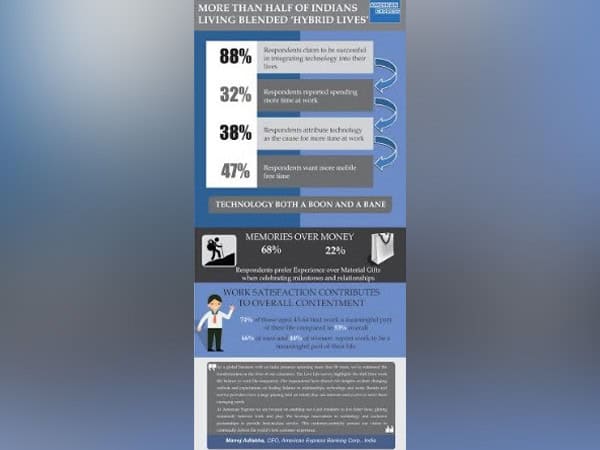New Delhi: There is growing interconnectedness around the world, in both personal and work life, as well as real and virtual interactions. This is among the key findings of a recent survey conducted by American Express and market research firm Morning Consult in eight countries across the world.
The study throws up interesting insights into the changing lives of Indians when it comes to the evolving approach to work and life and how technology is both a boon and a bane.
32 percent respondents reported spending more time at work in the last two years with 38 percent attributing technology as the cause. 88 percent respondents claim to be successful in integrating technology into their lives, but 47 percent want more mobile free time.
Tellingly, experiences (68 percent) override material gifts (22 percent) as being more meaningful when celebrating milestones and relationships.
“As a global business with an India presence spanning more than 90 years, we’ve witnessed the transformation in the lives of our customers. The Live Life survey highlights the shift from work life balance to work life integration. Our respondents have shared rich insights on their changing outlook and expectations on finding balance in relationships, technology and work. Brands and service providers have a large playing field on which they can innovate and evolve to serve these emerging needs,” said Manoj Adlakha, CEO, American Express Banking Corp., India.
“At American Express we are focused on enabling our Card members to live fuller lives, gliding seamlessly between work and play. We leverage innovations in technology and exclusive partnerships to provide best-in-class service.
This customer-centricity powers our vision to continually deliver the world’s best customer experience,” he added.
Findings from “Live Life” survey pertain to various aspects of a blended lifestyle, including virtual and social interactions, satisfaction accorded by work, happiness derived from parenting, and the two T’s that reign supreme – Travel and Technology.
The survey takes these parameters into account to showcase the patterns in demographic sub groups, such as different age-groups, men and women, and state-wise trends.
Parents working harder than non-parents, both at home and work!
-Non-parents are more likely than parents to be spending fewer hours at work.
-Personal time contributes more to happiness of non-parents (46 percent) compared to parents (39 percent)
-Non-parents (47 percent) are more likely to say that traveling is on their bucket list than parents (37 percent)
Virtual and social interactions remain important
-Virtual reactions are very important for the 30-44 age group
-More women (63 percent) than men (54 percent) consider social media important to share experiences
Work satisfaction contributes to contentment with life
-74 percent of those aged 45-64 find work a meaningful part of their life compared to 53 percent overall
-More men (66 percent) than women (40 percent) report work to be a meaningful part of their life
Technology lauded as an enabler, but mobile fatigue reported across the board
-56 percent women claim to be very successful in integrating technology into their life as compared to 42 percent men
-Women are proportionately more engaged with technology, as more men (66 percent) are likely to have mobile-free time than women (57 percent)
-In what could be alarming to some marketers, younger respondents are more likely than older respondents to want more mobile-free time
Women happier today, living more “connected” lives
-Women reported being “significantly happier” today (45 percent women vs. 30 percent men)
-More women (84 percent) find spending time with family and friends as meaningful, compared to men (68 percent)
-40 percent women believe work is a meaningful part of their life, compared to 66 percent men
-Interestingly, more number of men and women rank time spent with family and friends as meaningful, compared to their feedback on the role of work
-Shared experiences far more important to women (63 percent) than men (54 percent)
Men somewhat more materialistic than women
-Bucket-list of men more likely to include material goals such as buying a house (46 percent men vs. 35 percent women), buying a dream car (44 percent vs. 29 percent) and achieving a professional goal (46 percent vs. 33 percent)
Culture creates context
-Telangana and Kerala report the highest levels of integrated work and life
-74 percent of the respondents in Gujarat are most likely to put more effort into everyday personal interactions versus 50 percent on average
-Respondents in Kerala (94 percent), Karnataka (92 percent) and Andhra Pradesh (91 percent) are most likely to say they have enough time to enjoy areas of life that make them happy.
-91 percent of the respondents in Tamil Nadu consider personal relationships as paramount as against 69 percent average.
Survey Methodology
Morning Consult on behalf of American Express, conducted a series of surveys in eight markets (India, Australia, Canada, Hong Kong, Japan, Mexico, the United Kingdom, and the United States) of approximately 2,000 adults from March 3 – 14, 2018.
Some of the key findings of the survey cut across demographic sub groups, such as male/female, parents/non-parents, managers/directors, apart from statewide distribution that clearly highlights the stark differences across India’s diverse regions.
Results from the full survey for adults has a margin of error of +/- 3 percent. The interviews were conducted online in the market’s primary language. The adult population data were weighted to approximate a target sample of adults based on age, gender, and educational attainment.(ANI)

